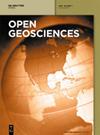应用于金沙江地区干旱监测的常见干旱指数研究
IF 1.3
4区 地球科学
Q3 GEOSCIENCES, MULTIDISCIPLINARY
引用次数: 0
摘要
基于2010-2020年MODIS数据和金沙江流域33个气象站1990-2020年的降水、气温和土壤水分数据,研究了不同遥感干旱指数在金沙江流域的适用性。这些指数包括温度状况指数(TCI)和温度植被干旱指数(TVDI),植被状况指数(VCI)、植被补给水分指数(VSWI)、标准化降水蒸散指数(SPEI)和标准化降水指数(SPI)的研究结果分别表明:TCI与TVDI、VSWI与TCI、VSWI与TVDI、VSWI与TVDI、VSWI与TVDI、VSWI与TVDI、VSWI与TVDI、VSWI与TVDI、SPEI与SPI。VSWI 和 VCI 之间的相关性显著。VCI 与 SPEI 和 SPI 的相关性最低。TCI 与 VSWI 的平均相关系数相似。VSWI、SPEI 和 SPI 之间的相关性在 1 月、3 月和 10 月较低,在其他月份达到显著或以上水平。TVDI 与 SPEI 和 SPI 的相关性最高。TVDI与全年各月土壤水分均有明显的相关性,表明TVDI可有效地用于金沙江流域的遥感干旱监测,具有较强的适应性。根据TVDI对金沙江流域旱情监测的时空分析,12月和1月的旱区主要分布在金沙江流域的中游,轻旱区主要分布在金沙江流域的上游和下游。3 月至 6 月,金沙江中游发生重旱的风险增大,金沙江流域中旱面积也有所增大。7 月至 11 月旱情较前几个月有所减弱。中度干旱区主要分布在金沙江中下游,轻度干旱区主要分布在金沙江流域上游。本文章由计算机程序翻译,如有差异,请以英文原文为准。
The research of common drought indexes for the application to the drought monitoring in the region of Jin Sha river
Based on MODIS data from 2010 to 2020 and precipitation, air temperature, and soil moisture data of 33 meteorological stations in Jinsha River Basin from 1990 to 2020, the applicability of different remote sensing drought indexes in Jinsha River Basin was studied. These indexes include temperature condition index (TCI) and temperature vegetation drought index (TVDI), the results of vegetation condition index (VCI), vegetation supply water index (VSWI), standardized precipitation evapotranspiration index (SPEI), and standardized precipitation index (SPI) showed that TCI and TVDI, VSWI and TCI, VSWI and TVDI, VSWI and TVDI, VSWI and TVDI, VSWI and TVDI, VSWI and TVDI, SPEI and SPI, respectively. The correlation between VSWI and VCI was significant. VCI had the lowest correlation with SPEI and SPI. The average correlation coefficient between TCI and VSWI was similar. The correlation between VSWI, SPEI, and SPI was low in January, March, and October and reached significant or above levels in other months. TVDI had the highest correlation with SPEI and SPI. TVDI was significantly correlated with soil moisture every month of the year, indicating that TVDI can be effectively used for remote sensing drought monitoring in Jinsha River Basin and has strong adaptability. According to the temporal and spatial analysis of drought monitoring in the Jinsha River Basin by TVDI, the drought areas in December and January are mainly located in the middle reaches of the Jinsha River Basin, while the light drought areas are mainly located in the upper and lower reaches of the Jinsha River Basin. From March to June, the risk of severe drought increased in the middle reaches of the Jinsha River, and the moderate drought area in the Jinsha River Basin also increased. The drought from July to November was weaker than in the previous months. The moderate drought area is mainly located in the middle and lower reaches of the Jinsha River, and the mild drought area is mainly distributed in the upper reaches of the Jinsha River Basin.
求助全文
通过发布文献求助,成功后即可免费获取论文全文。
去求助
来源期刊

Open Geosciences
GEOSCIENCES, MULTIDISCIPLINARY-
CiteScore
3.10
自引率
10.00%
发文量
63
审稿时长
15 weeks
期刊介绍:
Open Geosciences (formerly Central European Journal of Geosciences - CEJG) is an open access, peer-reviewed journal publishing original research results from all fields of Earth Sciences such as: Atmospheric Sciences, Geology, Geophysics, Geography, Oceanography and Hydrology, Glaciology, Speleology, Volcanology, Soil Science, Palaeoecology, Geotourism, Geoinformatics, Geostatistics.
 求助内容:
求助内容: 应助结果提醒方式:
应助结果提醒方式:


